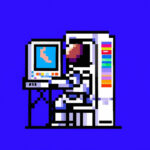Coding is an essential skill for many professions, and learning how to code can open up opportunities for career advancement. Coding is a critical component of the technology industry, from web development to artificial intelligence (AI). If you’re looking to start a career in coding, here are some steps for building your coding career.
Go to:
What Is Coding?
Coding is an essential skill to have in the technological age. It involves creating computer programs and websites that enable users to interact with people and machines in a digitally connected world.
In essence, coding is a language that allows us to give computer instructions. Writing code requires technical knowledge, such as programming languages, algorithms, data structures and design principles.
Individuals who can understand, write and debug code are highly sought after in today’s job market. Understanding the basics of coding puts people at a significant advantage in their professional lives, whether they want to become software engineers or create apps for fun!
What Does A Coder Do?
Coding is much more than typing out a bunch of lines of mysterious numbers and letters. Coders are critical in today’s tech-driven world as they write the instructions that power our websites, apps, computers, and many other things.
A coder’s role is to create software, ranging from simple instructions to complex algorithms. This could involve troubleshooting existing code or writing new code from scratch to build applications.
Many coders even specialize in specific types of coding, such as mobile apps or web development. All in all, coders play an essential role in making sure technology works seamlessly for us!
How To Steps On Building Your Coding Career
Step 1: Experience It
Before taking any other actions, we recommend trying out coding first. If you’re starting, don’t worry about getting everything right away—it takes practice and patience. The idea is to start with something small and simple so that you can get comfortable with the basics of coding. Check out online tutorials or join online communities like Stack Overflow or Reddit for answers to some of your questions.
Step 2: Get Coding
Now it’s time to dive into real-world projects and build your skillset. Consider joining a coding Bootcamp or taking online courses from learning platforms such as Coursera or Udemy to hone in on specific skills such as web design or data science. You can also find open-source projects or hackathons that allow coders from all levels of experience to collaborate on projects.
Step 3: Educate Yourself
Many employers look for candidates with formal education in computer science, software engineering, and related fields when hiring coders for their teams. So if this interests you, consider getting a degree from a college or university specialising in these disciplines. It’s helpful if you already have some prior experience before enrolling in school; many programs will also offer externships where students can gain hands-on experience while still enrolled in classes.
Step 4: Enhance Your Skills
Once you have the basics down, it’s time to start building more advanced skills, such as debugging and problem-solving techniques and developing specialized knowledge around languages like Java, Python, etc. In addition to taking classes and attending workshops, consider reading books by authors who specialize in coding topics—this will give you great insight into the industry and help you keep up with trends within the field.
Step 5: Develop Your Portfolio
As with any job search process, having a portfolio is essential for gaining recognition among potential employers. Make sure to include examples of work done on past projects and references from employers or mentors who can vouch for your expertise and skill level in some regions of coding technology (frontend web development, mobile app design/development). This will show recruiters that you have taken the initiative and have something tangible to show off your abilities as a coder!
If you are planning on making an online portfolio, you can easily create one with the help of website builders like Wix, Squarespace, or WordPress.
Step 6: Prepare To Apply
Once your portfolio is ready (and updated regularly!), it’s time to start searching for jobs! Use sites like LinkedIn and Indeed, as well as job boards geared explicitly towards coders like Stack Overflow Careers or AngelList Jobs Board. Additionally, attend hackathons and tech events where recruiters often make appearances; this is an excellent way of networking face-to-face, which could potentially lead directly into interviews!
3 Skills A Coder Might Need To Have
Learning how to code can be a valuable skill, whether you’re looking for a career in coding or want to learn something new. But what skills do coders need to be successful? Let’s explore the three core skills that any coder should have.
Problem-Solving & Critical Thinking Skills
Coding is all about problem-solving and critical thinking. Coders must be able to think through problems and come up with creative solutions that are both effective and efficient. Coders need to understand the problem they’re trying to solve before they start coding so that they can approach it in the most effective way possible. Good problem-solving skills will help coders figure out how to make their code work as efficiently as possible while still being effective at solving the problem.
Attention to Detail
The minor details can make all the difference when it comes to coding. Coders must pay close attention to detail to ensure their code is bug-free and working correctly. Attention to detail is also essential when writing documentation, which helps other people understand how the code works. Without good attention to detail, coders may write inefficient or buggy code that won’t work correctly.
Collaboration & Communication Skills
Good communication and collaboration skills are essential for any coder who wants to succeed in their profession. Coding can often involve working with others on projects, so coders must collaborate effectively with their team members to get things done quickly and efficiently. Communication is also crucial when it comes time for coding reviews; clear communication between coders and reviewers is necessary for problems to be noticed, and mistakes might slip through the cracks.
Wrapping Up!
Now you know the legit steps on building your coding career. Starting a career in coding requires dedication and hard work, but with persistence and determination, anyone can become proficient in programming languages like HTML, CSS, and JavaScript. Start by getting familiar with the basics, then explore different platforms such as WordPress or Shopify before finally committing yourself to regular practice sessions! With enough effort and dedication, you will soon find yourself well on your way toward becoming an expert coder – good luck!



